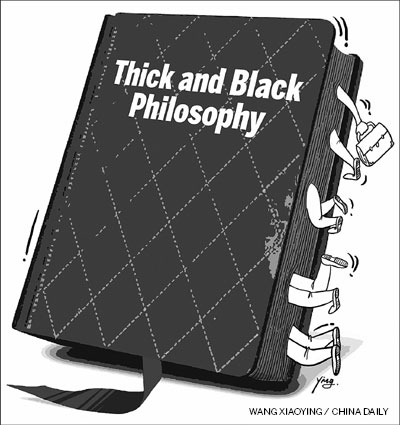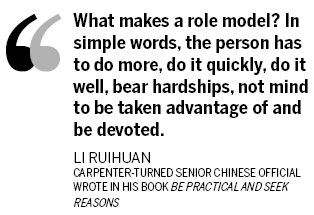Reading on the way up
By Han Bingbin (China Daily)
Updated: 2010-06-16 16:00
 |
Large Medium Small |

More officials are turning to books for self-enhancement and better governing skills. Han Bingbin reports
Yu Zhisheng, a government official on youth relations in Beijing, recently bought 10 copies of a book for his colleagues and friends. The book Wu Shi Qiu Li (Be Practical and Seek Reasons) written by Li Ruihuan, a retired top Chinese political adviser who started as a carpenter and later became one of the most powerful politicians in China, had given Yu insights into analyzing and solving problems at work and he wanted to share the thoughts with his buddies.
Yu is not alone in his enthusiasm. Sharing books are fast becoming a constant trend among government officials that reflects both a need to connect and express their common mindsets.
"Books are a constant subject of discussion among officials," Yu said.
Among the most interesting books that officials have read, many deal with the topic of climbing the political ladder in local governments. Two such books, Zi Zhi Tong Jian, (The Common Lessons for the Government), and Hou Hei Xue, (The Thick Black Philosophy), offer advice on dealing with colleagues in the workplace and with people in society. Hou Hei is a term coined in 1917 in a book by the same title by the scholar Li Zongwu. In the book, he wrote that "when you conceal your will from others, that is thick; when you impose your will on others, that is black."
"Knowing Hou Hei is about learning how to handle people, which is very useful, especially when it comes to dealing with corrupt officials," said Mao Shoulong, a public-policy professor at Renmin University of China. "Like driving, it is always helpful to learn from experienced drivers. Most officials only carry out orders by their superiors and they don't make decisions on their own."
Zhou Xiaozheng, professor of sociology at Renmin University of China, said books of self-enhancement that teach how to employ political power generate the most interest among officials he knows.
"Officials are inseparable with power," Zhou was quoted as saying by the International Herald Leader, a Chinese-language newspaper under Xinhua News Agency. "They need to understand the clear rules. They dislike books extremely left or right. They want to be slick. Through reading these books, officials analyze political development."
But officials who read Hou Hei books rarely share with each other. "They are more willing to express their reviews on books in history and translated foreign books," said an official surnamed Han, who is in his late 40s in Beijing.
Han said many officials read history books, especially about the history of the Kuomintang. He said that when he was young, that part of Chinese history was excised and now that details of the Kuomintang is clear, it helps him to have a complete picture of Chinese history.
Premier Wen Jiabao recently said that "reading can change a person's life; a person who reads can change the world. But a person who does not read has no future and a nation without reading has no future". Immediately after Wen endorsed The Wealth of Nations by Western economist Adam Smith in an interview with the Financial Times last year, Chinese readers flocked to what is considered a masterpiece on economics.
At a bookstore for the School of the Central Committee of the Communist Party of China - the top training facility for senior government officials - favorite book topics among students are politics, economics, history and the environment.
Among the top 18 bestsellers at the store, is The Black Swan from Lebanese essayist Nassim Nicholas Taleb that deals with the "impact of the highly improbable" by circling around chance.
Details of Democracy: Observation on Contemporary American Politics by Dr Liu Yu, a Chinese scholar who is currently a lecturer at the University of Cambridge, is a collection of her essays about democracy in the West. It is one of the favorites among Party members at the school.
Zhu Shifen, a bookstore sales clerk where senior officials pass by every day, said the store's bestseller list can't be beat in its accurate reflection of what the nation's leaders are reading at the moment.
